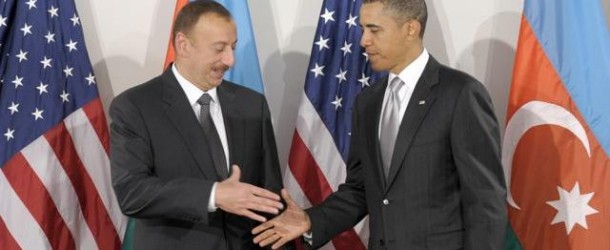The issue of participation of our head of state at the summit dedicated to nuclear security was finally brought to a close. U.S. President Barack Obama had sent a letter to the President Ilham Aliyev inviting him to attend the Fourth Nuclear Security Summit to be held in March this year in Washington DC. Deputy Head of the Presidential Administration and the Head of the Foreign Relations Department Novruz Mammadov tweeted this news.
Invitation from the U.S. leader extended to our head of state put an end to all the doubts and insinuations voiced by the ill-wishers. The White House invites Ilham Aliyev to the Nuclear Security Summit, thus recognizing position and relevance of our country that, according to the letter by the U.S. President, ‘demonstrated steadfast support of the global nuclear security architecture’. It is no coincidence that the letter expresses hope that Azerbaijan will continue to prioritize efforts to interdict nuclear and radiological materials. It is no secret that we have been vigorously involved in combatting cybercrime and spare no efforts in fighting nuclear terrorism. From the early days of our independence, we have demonstrated to the world our determination to be an active part of those processes.
By the way, this would be not be the first participation of our president at such a summit. President Ilham Aliyev was among the participants of the Third Nuclear Security Summit held in 2014 in Hague. In his address to the Summit, our head of state highlighted the important role the International Atomic Energy Agency plays in solidifying nuclear security measures. He noted that our country cooperates actively with this organization across the entire spectrum of nuclear security issues and supports efforts by the UN aimed at cementing the Global Initiative to Combat Nuclear Terrorism to which Azerbaijan was a signatory.
It was exactly in Hague where speaking of danger posed by the 40 years old outdated nuclear power plant in Armenia, President of Azerbaijan underscored how menacing this facility was for the region and the immediate neighborhood. Consequences of any accident there would be disastrous. However, instead of mitigating the international concern and shutting down that plant, Armenia decided to extend its operation until 2026, despite that it is located in seismic zone and is using archaic and dangerous technology.
Presence of our President in Hague made it clear that Azerbaijan attached utmost importance to all significant issues of global relevance. Therefore, it was only natural that the President Aliyev was invited to the summit, this time to be held in Washington.
Briefly about the format of the event. Nuclear Security Summit is a meeting dedicated to prevention of nuclear terrorism that poses immense danger for the international community in the XXI century. The summits that bring together heads of state and government of many nations as well as heads of international organizations are platforms for addressing major issues of nuclear security, including reduction of hazardous materials stockpiles around the world, security of radioactive sources and solidifying of cooperation in these areas. Last summit of 2014 welcomed 58 world leaders (including heads of five international organizations), over five thousand delegates and three thousand journalists.
Major objective of the Summit in Hague was the assessment of progress made at previous meetings in Washington and Seoul, identification of new goals and means of their accomplishment. Prevention of nuclear terrorism was the subject of particular attention in Hague. Although nuclear terrorism and issues related to the security of shipment were among the official topics of the agenda, Ukraine crisis was also addressed there. Therefore, it is safe to presume that pressing problems of the international politics would also be discussed in March in Washington. And we all know that there is a backlog of those.
It is worthy to mention that the invitation for President of Azerbaijan also indicated position of the White House on U.S.-Azerbaijan relations and strategic partnership between the two nations. This factor would certainly contribute to rapprochement between the two states and rebuilding of trust. In essence, Barack Obama’s invitation is definitely a recognition of the role and position of Azerbaijan in the South Caucasus, and aspiration to develop U.S.-Azerbaijan ties. This factor will be conducive in bringing two countries closer and enhancing mutual understanding on many issues related to international problems of global and regional significance.
Another side of the issue has to do with the fact that by extending that invitation President of the United States once again emphasized that key foreign policy and global security priorities, including issues associated with advancement of bilateral relations remain a prerogative of the head of state. Namely, the executive power in the U.S. has a pragmatic approach towards cooperation with Azerbaijan and has own interests in continuing engagement with our country on different fronts. Matters of nuclear security are no exception.
This once again illustrates that endeavors of certain American lawmakers, backed by different lobbyist circles and other quarters pursuing own agenda and self-interests do not always concur with the national ones. Most recent case is the plain pro-Armenian effort on the part of Christopher Smith – Chairman of the Helsinki Commission of the U.S. Congress. This is one of the many examples where we see aggravation of relations between the executive and legislative powers in the U.S.
Thus, one may conclude that even if someone, driven by narrow special interests, aims to push forward an anti-Azerbaijan piece of legislature, it does not mean that the U.S. President would change his stance on the issue of relations with the official Baku. This is of paramount importance in light of some of the initiatives made by certain members of the U.S. Congress.
In other words, it is a testimony that continuation of normal relations between Baku and Washington corresponds to the interests of both countries. This demonstrates that Azerbaijan is recognized and our country has a considerable role to play in the U.S. foreign policy.
Fikrat SADIKHOV
Political Scientist, Professor at the Western University
Source: Newtimes.az

























































